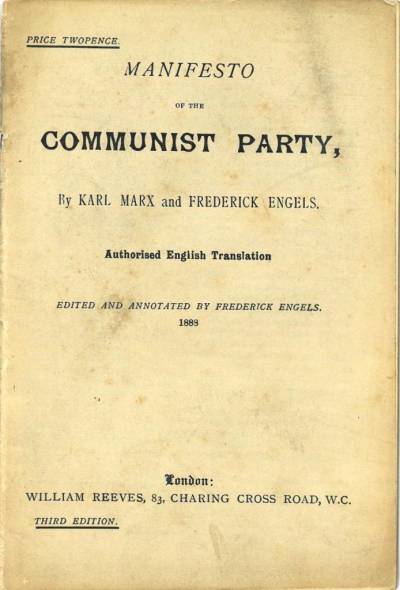Communism is a vision of a classless society, in which property is controlled communally.
It is founded on Marxism - a political philosophy that looks not only to understand society but also to change it.
 In the Manifesto of the Communist Party, Marx and Engels explained how and why society developed from tribal societies (primitive communism) to class society (slavery, feudalism and then capitalism), and how it would develop onwards through socialism to a classless communist society. Their analysis was based on the study of modern industrial capitalism in Britain - they showed how the working classes were exploited under capitalism, which inevitably led to economic crisis.
In the Manifesto of the Communist Party, Marx and Engels explained how and why society developed from tribal societies (primitive communism) to class society (slavery, feudalism and then capitalism), and how it would develop onwards through socialism to a classless communist society. Their analysis was based on the study of modern industrial capitalism in Britain - they showed how the working classes were exploited under capitalism, which inevitably led to economic crisis.
They argued that to achieve socialism, working class people would have to take political power into their own hands by building their own organisations, not only trade unions, but also a political party to lead the struggle.
The Manifesto was published in 1848 as a platform for the Communist League, a working men's association; the defeat of the workers' revolt in Paris later in 1848 was followed by ruthless treatment of the leaders of the League.
The International Working Men's Association, the First International, was founded in London in 1864, with the express aim of welding into one body the militant workers of Europe and America. Marx drew up the programme and there were a number of Congresses held before the Paris Commune of 1871, the first time working people had taken power. It broke up in 1874, with a split between Marxists and anarchists.
The Second International was formed in 1889 and lasted until 1916.

Frederick Engels, Zurich, 1893
The Russian Revolutions in 1917 deposed the Tsar and brought the Bolsheviks (Communists) to power, and led to the formation of the Soviet Union.
Lenin, the leader of the Bolsheviks, had emphasised the need for revolutionary organisation, and developed the role of a vanguard disciplined Communist Party, based on a combination of central control and democratic structures known as democratic centralism.
The Communist Party of Great Britain (CPGB) was founded in 1920 drawing inspiration from the young Soviet republic, and participating in the international communist movement.
Resources about communism in the library collection
The Library has an extensive collection of books: on Marxism and Marx and Engels; contemporary writings on the Paris Commune and Russian Revolution; copies of the proceedings of the First and Second Internationals; very early (1918-20) copies of the People's Russian Information Bureau Bulletins (and material on Hands Off Russia campaigns); a very wide range of CPGB literature, as well as the archives of communist activists including Mick Jenkins, Benny Rothman and Angela Tuckett.
Click here to search the Library catalogue.
Related Object of the Month
November 2014: 1935 Daily Worker Bazaar Menu
 A menu from a 1935 bazaar in aid of The Daily Worker. The Daily Worker, the newspaper of the Central Committee of the Communist Party of Great Britain, launched its first issue on 1 January 1930. This quoted Lenin: ‘Without a political organ, a movement deserving to be called a political movement is impossible in modern Europe.
A menu from a 1935 bazaar in aid of The Daily Worker. The Daily Worker, the newspaper of the Central Committee of the Communist Party of Great Britain, launched its first issue on 1 January 1930. This quoted Lenin: ‘Without a political organ, a movement deserving to be called a political movement is impossible in modern Europe.
Resources held at the Labour History Archive and Study Centre
The Communist Party of Great Britain archive is held at the Labour History Archive and Study Centre, which is based at the People's History Museum

